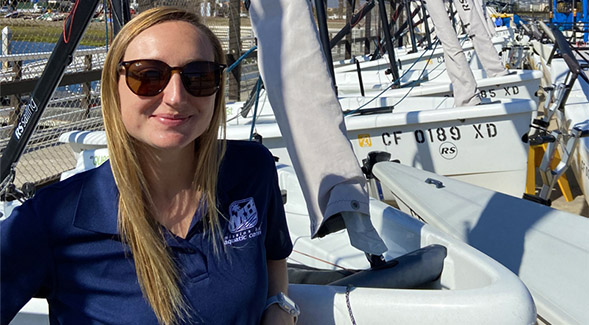Inspiring Interest in Ocean Conservation: Q&A with Sara Rosenblatt
Mission Bay Aquatic Center marine science program assistant Sara Rosenblatt was recently honored by U.S. Sailing for developing STEM programs for youth.

Located in San Diego’s Mission Bay Park, the Mission Bay Aquatic Center (MBAC) offers a wide variety of educational programming and instruction for community members.
Recently, Sara Rosenblatt, MBAC marine science program assistant and U.S. Sailing Reach educator, was recognized by U.S. Sailing for her achievements in developing STEM programs for youth as part of International Women and Girls in Science Day, which takes place each February.
Rosenblatt, who recently graduated from SDSU’s marine ecology graduate program and has worked at MBAC for three years, has worked diligently to develop a marine science program at MBAC that inspires interest in ocean conservation, and develops lifelong connections to the ocean through real world experiences.
The SDSU News Team recently spoke with Rosenblatt about what most interests her in marine ecology and conservation and what the national recognition means to her.
What interests you most about marine ecology and conservation?
What interests me most about marine ecology and conservation is that the health of our oceans is so central to the health and well-being of our planet. More than 70% of the earth is covered in water and 50% of the oxygen we breathe comes from oxygen produced in the ocean so no matter where in the world you live the ocean is impacting your day-to-day life. Ocean conservation is a global issue not just limited to coastal cities.
Why is it important for women and girls to explore STEM subjects, especially science? What inspires you to be involved in STEM education?
It's important for women and girls to explore STEM subjects because women have historically been underrepresented in these fields, including science. That is starting to change, but it will be up to our generation of women and girls to keep that momentum going and make sure that women have a seat at every table where important decisions are being made, particularly in the STEM fields. I had many teachers, professors, and counselors who sparked my interest in science and inspired me to pursue a career in marine ecology and by continuing to be involved in STEM education I am able to pass that on and inspire the next generation of girls to be interested in science as well.
You were recently recognized by U.S. Sailing for your achievements in developing STEM programs as part of International Women and Girls in Science Day. What does the honor mean to you?
I feel so honored to have been chosen by U.S. Sailing to be recognized for the work I have been involved in developing STEM programs. I was very excited to hear that U.S. Sailing wanted to recognize women for their contributions to STEM on International Women and Girls in Science Day since both sailing and science have historically been dominated by men and hope that taking the time to recognize contributions that women are making will help change that.
What activities take place during International Women and Girls in Science Day and what makes it a memorable experience for youth attending?
Students have the opportunity to participate in a host of different science activities such as catching fish to observe with a seine net, collecting plankton to study under a microscope, and hands-on activities to understand how humans impact our environment. I think having the opportunity to experience these activities first-hand makes this a really memorable experience for the students and helps them see the ways in which they are already participating in real science.
What is one fact about the ocean that not many people know, but would be surprised to read?
One fact about the ocean that people may be surprised to read is that there are over 300 different species of sharks and the smallest could fit in your hand. Sharks tend to get a bad reputation in the media but are really amazing creatures and there is such a diversity of species in this group. Sharks and other top predators are extremely important for keeping our ocean ecosystems healthy and thriving.



